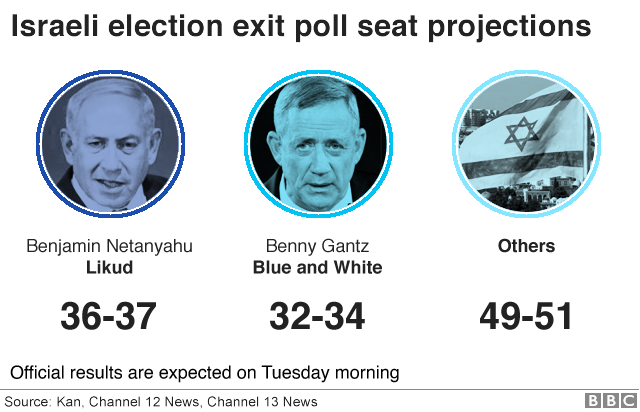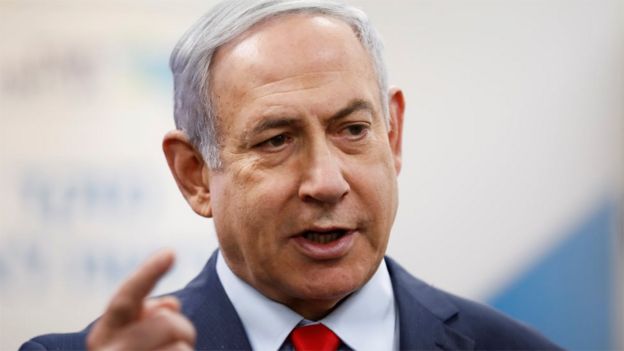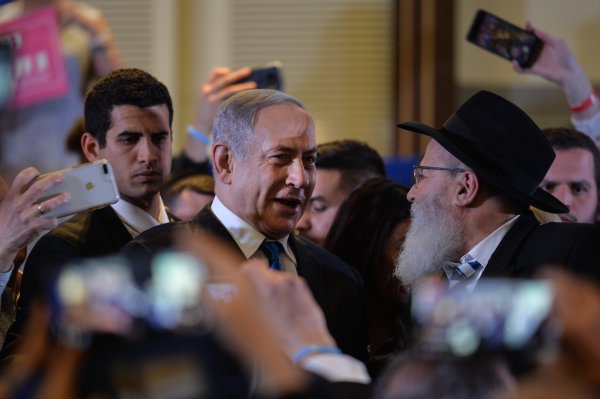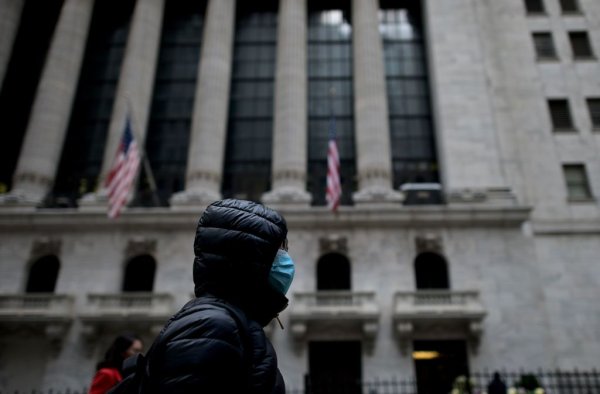Prime Minister Benjamin Netanyahu has claimed victory in Israel's general election, with early results putting him ahead of main rival Benny Gantz.
With almost a quarter of votes counted, Mr Netanyahu's right-wing Likud party has secured 28.73%, the Central Election Committee (CEC) says.
Mr Gantz's centrist Blue and White alliance is trailing with 23.26%.
However, exit polls suggest Likud and its right-wing allies might fall just short of a majority in parliament.
The Joint List - a bloc of Arab parties - is currently in third place, with 12.36%.
Monday's election was Israel's third in less than a year. Neither of the two main party leaders was able to command a majority in the 120-seat parliament following the last two rounds.
- Benjamin Netanyahu: Commando turned PM
- The ex-military chief trying to unseat Netanyahu
- What does Trump’s Middle East plan say on key issues?
Mr Netanyahu, 70, is Israel's longest-serving leader. He is seeking a record fifth term, having been in office from 1996 to 1999 and again from 2009.
The election took place two weeks before the prime minister is due in court to face corruption charges, which he denies.
What did the exit polls suggest?
Pre-election opinion polls suggested Likud and Blue and White were more or less tied, with neither Mr Netanyahu nor Mr Gantz sure of a clear path to victory.
But the exit polls published by Israel's three main broadcasters on Monday evening indicated Likud was on course to win between three to five more seats than Blue and White.

The Joint List alliance of Arab parties was projected to get 14 or 15 seats; the ultra-Orthodox parties Shas and United Torah Judaism 16 or 17 between them; the nationalist Yisrael Beitenu party six or seven; the right-wing Yamina alliance six or seven; and the centre-left Labour-Gesher-Meretz list six or seven.
If the exit polls are accurate, it would mean that Likud and its right-wing allies end up with 59 or 60 seats - one or two seats shy of a majority in parliament.
The initial results are expected on Tuesday, and exit polls have displayed inaccuracies in the past.
How have the party leaders responded?
After the exit polls were published, Mr Netanyahu posted on Twitter a photo of him celebrating "a great victory for Israel".
Later, he wrote: "We won thanks to our belief in our path and thanks to the people of Israel."
Likud said in a statement that Mr Netanyahu had spoken with the heads of other right-wing parties and "agreed to form a strong national government in Israel soon".
 AFP
AFP
Mr Gantz did not immediately admit defeat, but accepted that the exit polls did not appear promising.
"I realize and share your feelings of disappointment and pain, for this isn't the result that we wanted to happen," he said.
Israel, he added, "needs unity, it needs conciliation, it yearns for a leadership that unites, and that is something that we will continue to offer the Israeli public".
Yisrael Beiteinu leader Avigdor Lieberman, who was in the position of kingmaker after the last two elections, said it would keep its campaign promise not to join a coalition with religious parties.
"We are party with an orderly worldview, with principles," he said.
In the coming days, President Reuven Rivlin will ask the various party leaders who they believe has the best chance to form a government.
What could this mean for Palestinians?
The secretary general of the Palestine Liberation Organisation (PLO), Saeb Erekat, tweeted after the exit polls were published that it was "obvious that settlement, occupation and apartheid have won the Israeli elections".
 REUTERS
REUTERS
During the campaign, Mr Netanyahu vowed to swiftly annex Jewish settlements and the Jordan Valley in the occupied West Bank if he won a fifth term.
Such a move was made more possible after US President Donald Trump released his Middle East peace plan in January. Mr Trump said the US would "recognise Israeli sovereignty over the territory that my vision provides to be part of the State of Israel", including parts of the West Bank - a departure from past US positions.
The Palestinians, who have rejected Mr Trump's plan as one-sided, insist that all the settlements must be removed if there is to be final peace deal.
More than 600,000 Jews live in about 140 settlements built since Israel's 1967 occupation of the West Bank and East Jerusalem. The settlements are considered illegal under international law, though Israel disputes this. The US has also declared it no longer sees the settlements as illegal.
What about Mr Netanyahu's trial?
A wily political operator, Mr Netanyahu is known to his supporters as "the magician" for his ability to defy sceptics.
 REUTERS
REUTERS
He fought this election under the cloud of criminal proceedings, as he is due in court on 17 March to face charges of bribery, fraud and breach of trust in connection with three separate cases.
He is alleged to have accepted gifts from wealthy businessmen and dispensed favours to try to get more positive press coverage.
Mr Netanyahu has strongly denied any wrongdoing, saying he is the victim of a politically motivated "witch hunt".
Even if convicted, Mr Netanyahu would not be required to step down as prime minister until the appeals process was exhausted.
Netanyahu Fails to Secure Majority in 3rd Israeli Election in a Year, Exit Polls Show
JERUSALEM) — Prime Minister Benjamin Netanyahu’s Likud Party on Monday emerged as the largest party in the country’s third election in under a year, exit polls indicated, but it was unclear whether the embattled Israeli leader could secure a parliamentary majority as he prepares to go on trial for corruption charges later this month.
Exit polls on Israeli TV stations appeared to show that Likud and its smaller ultra-religious and nationalist allies had captured 59 seats, two short of the majority required to declare victory.
His opponents were projected to get a majority of 61 seats. But with his main challenger, the centrist Blue and White party, trailing Likud by several seats and the rest of the opposition fragmented, polls were pointing to a continued paralysis of Israel’s political system.
Addressing a raucous crowd of thousands of ecstatic supporters at 2:30 a.m., Netanyahu claimed a “giant victory.”
“This is a victory against all the odds, because we stood against powerful forces,” he said. “They already eulogized us. Our opponents said the Netanyahu era is over.”
He vowed to immediately begin work to form a new coalition and press forward with a hardline agenda that includes annexing large parts of the West Bank — a step that would destroy any remaining hopes of establishing a Palestinian state.
Despite the wild celebrations, Netanyahu could have difficulties forming a new government. After initially predicting that the prime minister was on the cusp of victory, exit polls projected a tight race that appeared to leave him short of the parliamentary majority he covets.
If official results on Tuesday match the exit polls, Netanyahu could go on trial March 17 weakened and stuck in political gridlock.
Netanyahu was indicted in November on charges of fraud, breach of trust and accepting bribes, making him the first sitting prime minister to be charged with a crime. He denies any wrongdoing and says he is the victim of a witch hunt by police, prosecutors and a hostile media.
During the campaign, Netanyahu failed in a bid to secure immunity from prosecution. As prime minister, he could still rally public opposition against prosecutors and judges in the case. He also could seek other avenues to delay or derail the proceedings against him.
Aviad Glickman, the legal affairs correspondent for Channel 13 TV, said that if Likud emerges victorious, Netanyahu’s lawyers will likely seek to delay the trial. He also said there are serious concerns in the legal system that if Netanyahu secures another term, he will try to fire his attorney general, who filed the indictment against him, and push for legislation that would allow parliament to strike down Supreme Court rulings it opposes.
A Likud victory could also force the court to rule on Netanyahu’s future. An advocacy group, seeking to oust Netanyahu, earlier this year asked the court to rule whether an indicted parliament member can be designated prime minister and asked to form a new government.
The Supreme Court in January declined to rule on the request, saying it was premature. But the issue could come up again if President Reuven Rivlin formally taps Netanyahu to form a new government.
After elections, the president is responsible for picking a prime minister and forming a majority coalition. He usually chooses the leader of the largest party, but it’s not required, and the decision has been complicated by Netanyahu’s trial.
After September’s election, both Netanyahu and Gantz, a former military chief, were given opportunities to form coalitions. Both failed. With Likud projected to be the largest party, Netanyahu could again get first crack at assembling a coalition this time around.
According to the exit polls, Netanyahu’s Likud was projected to win 36 to 37 seats, up from 32 seats in September’s vote. Gantz’s centrist Blue and White party, which ran on a message that the prime minister is unfit to lead because of the serious charges against him, was projected to win 32-34 seats, roughly the same as in September.
If the final results hold up, the easiest way out of the impasse would be a unity government between Likud and Blue and White, which together command a solid parliamentary majority. Gantz, however, has ruled out a partnership as long as Netanyahu remains in charge. Netanyahu insists on remaining prime minister in any unity deal.
Addressing a crowd of enthusiastic supporters early Tuesday, Gantz did not concede defeat.
“This wasn’t the outcome that perhaps we would have wanted,” he said. Nonetheless, he said the party would not compromise its principles and would wait for final results.
Avigdor Lieberman, a former Netanyahu ally turned rival, appeared to once again emerge as the key player in coalition talks.
Lieberman has refused to endorse either major candidate, potentially giving him the final say in who controls a parliamentary majority. Lieberman, who opposes Netanyahu’s alliance with ultra-Orthodox religious parties, has said he will not allow a fourth straight election.
A weary-looking Lieberman vowed to stick to his principles and said he would take stock once the final results are in. “We won’t move a millimeter from what we promised our voters,” he said.
The election marked another setback for the once mighty Labor party, which governed the country for its first three decades. The party’s alliance was projected to get just six or seven seats, making it one of the smallest factions in parliament.
Addressing his supporters, party chairman Amir Peretz accused Gantz of cannibalizing Labor in a hopeless bid to emerge as the largest party.
Ayman Odeh, leader of the predominantly Arab Joint List, criticized Gantz for ruling out a partnership with his party.
“The problem was Blue and White’s racist attitude,” Odeh said, accusing Gantz of turning Blue and White into a “pale imitation” of the right wing. Noting that the Joint List was projected to capture an impressive 14 seats, Odeh said: “We did our part. They failed.”
Continued deadlock could potentially force the country into another election.
Netanyahu, the longest-serving leader in Israeli history, has been a caretaker prime minister for more than a year as a divided country has weathered inconclusive votes in April and September and prolonged political paralysis.
After opinion polls repeatedly showed the two rivals deadlocked, or with Gantz holding a slight lead, Likud began to edge ahead over the last two weeks or so.
Netanyahu sought to portray himself as a statesman who is uniquely qualified to lead the country through challenging times and boasts important relationships with world leaders, most critically, President Donald Trump. During the campaign, Trump unveiled a Mideast plan that is strongly favorable to Israel in a step that was seen as an election gift to Netanyahu.
With his career on the line, Netanyahu campaigned furiously. He took a hard turn to the right in hopes of rallying his nationalist base, promising to expand and annex West Bank settlements.
In a campaign marked by ugly smears, Netanyahu’s surrogates spread unfounded allegations that Gantz is corrupt, unstable and susceptible to blackmail by Iran.
But the candidates seemed to agree on one thing: The country cannot hold another election.
“The time has come to end the rounds of elections and form a government in Israel,” Netanyahu said. “The time has come to mend the rifts, the time for reconciliation has come.”
























.jpg)























































.jpg)

Inga kommentarer:
Skicka en kommentar